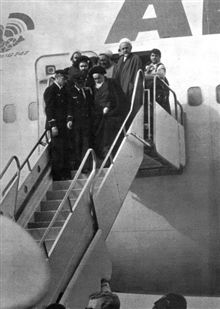http://www.rferl.org/featuresarticle/2007/02/8fb617b6-0c4c-4c65-b131-0d14cd536364.html
 |
| Mohsen Sazegara (file photo) |
| (courtesy photo) |
Sazegara used to be a true revolutionary. A student in the United States and a member of the anti-Shah student movement, he left school to join Iran's main religious leader, Ayatollah Ruhollah Khomeini, in his Parisian exile. He worked in the ayatollah's press office and helped organize interviews.
"I returned to Iran with Mr. Khomeini on that flight, and in the period between February 1 and 11, I became active in Sepah's school [among Khomeini's main headquarters] in the international-relations and press section," says Sazegara, as he recalls his experience as a 22-year-old on the historic plane trip that brought Khomeini back to Iran in February 1979, after 14 years in exile.
They were days of great hope for people, like Sazegara, who strongly opposed the U.S.-backed monarchy -- for its political repression and its Western influence over their country.
Upon his return to Tehran, Khomeini took control of the Iranian revolution. Ten days later, the revolution was concluded. After a referendum the Islamic Republic of Iran was officially created on April 1, 1979.
An Islamic constitution was adopted that gave ultimate authority to unelected religious leaders. Islamic laws were applied, and Islamic hijab -- covering all but hands and face -- became obligatory attire for women.
Early Disenchantment
Critics say the revolution failed to deliver on its promises of freedom and justice.
In the early years after the revolution, Sazegara helped form Iran's paramilitary Islamic Revolution Guards Corps (IRGC). He was also involved in shaping official radio broadcasts and held several government posts, including deputy minister for heavy industry.
Sazegara, and others, became disillusioned by unmet expectations. He began questioning the clerical establishment and one of its key bodies: the powerful Guardians Council, which has the power to vet laws approved by the parliament.
 Ayatollah Ruhollah Khomeini arriving in Tehran from his French exile on February 1, 1979 (Fars)
Ayatollah Ruhollah Khomeini arriving in Tehran from his French exile on February 1, 1979 (Fars)
"The beginning was in 1985, when I became into conflict with the Guardians Council over the budget law," Sazegara says. "In a toughly worded letter, I wrote to the then-minister of heavy industry that the behavior of this body was not appropriate."
Yet a decisive moment came when he landed in Tehran's notorious Evin prison over differences with the country's judiciary.
"There I witnessed scenes that I never imagined could happen: scuffles, use of abusive language, insults, people groaning and lamenting -- although I didn't see them beating anyone," Sazegara remembers. "But I heard the voice of a girl telling an interrogator, 'I can't endure more torture.'"
...And Prison Shock
His brief detention marked a turning point for Sazegara. He says he protested against prisoners' treatment at the hands of Evin's prison warden in a meeting with the founder of the Islamic republic.
"I said, 'Mr. Khomeini, if you agree with what Mr. Lajevardi is doing at Evin, you should tell us. If you are against it, then why don't you stop it?'" Sazegara says. "The result of this incident was that I decided to revisit the ideas of the founders of the revolution, because we had never imagined we would replace the shah's dictatorship -- which we opposed mainly because of torture and killings -- by an establishment that would do the same things, or maybe even worse."
Sazegara says he declined further government posts and pursued his studies in history. He also published several political publications that were all shut down by the judiciary.
Sazegara's candidacy for Iran's presidential election in 2001 was rejected by the Guardians Council, and he gradually became one of the most outspoken critics of the theocracy. He was arrested several times over his criticism of Iran's Constitution, which grants absolute power to the supreme leader.
Condemning 'Violent Revolution'
He says he concluded that, under the current establishment and constitution, real democracy cannot be achieved.
In 2003, Sazegara spent more than three months in prison -- where he launched a hunger strike and lost about 20 kilograms. He later traveled to London for medical treatment and then moved to the United States, where he is now a guest lecturer at Harvard University.
Twenty-eight years after Iran's revolution, Sazegara says he has come to the conclusion that revolutions do not bring democracy. The former revolutionary says "a violent revolution" is more likely to bring "a despotic regime."
He describes himself as an opponent of the current leadership, including Supreme Leader Ayatollah Ali Khamenei.
"If another shah came to power in Iran again, and he was a dictator, I would definitely fight against him," Sazegara says. "I am fighting against the rule of Mr. Khamenei and the legal despotism that rules the country for the same reason. But if I think back to when I was 22, [if I could do it again] I would not choose a revolutionary ideology to fight dictatorships."
He now supports democratic paths to change in Iran, including through a nationwide referendum.
"We have no other choice than to hold a [referendum] under the supervision of international organizations, so that we will be able to ask the people whether they want the Islamic establishment or not," he says. "Of course, talking about it is easy; but bringing it into practice is difficult."
Sazegara's revolutionary fervor evaporated long ago.
Some of his fellow revolutionaries remain loyal, of course. One of the most prominent among them is President Mahmud Ahmadinejad, who has vowed to return the country to its early revolutionary values.